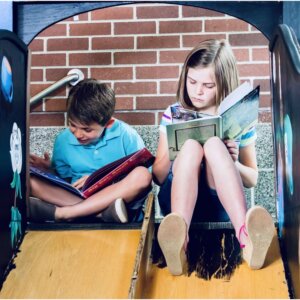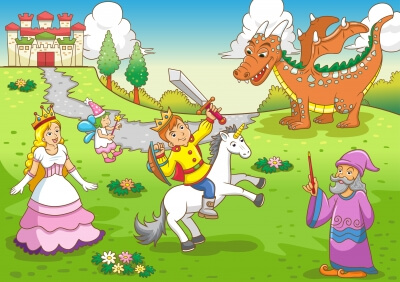What Should My Child Read?
Written by Tori Whaley
Published on December 29, 2015
Dyslexia Therapist, Tori Whaley, gives her advice on what your child should read depending on their needs.
Since I was a child in elementary school, libraries have been a favorite, nearly sacred place. Books filled with information I hadn’t learned and adventures I hadn’t taken inspired me to read more and more. For many children and their families, libraries are daunting. Parents are told that children should read a certain number of minutes per day, which turns into a frequent homework assignment. As a result, choosing books for a struggling reader can be confusing for a parent and stressful for a child.

What may surprise these parents is that the answer is often just as elusive for parents of good readers. What books are best for my child? To that end, I share the answer I find myself giving to any parent who asks:
It depends.
Don’t worry about grade level or what they are “supposed to be able to read” at their age. Instead think, “What is the purpose of reading?” and choose an appropriate selection accordingly. There are generally a few purposes for reading as follows:
Reading Purpose 1: Get Better at Reading

Once children begin to acquire independent word reading skills, practice is the key to improvement. However, not all books are appropriate for this type of practice. Books read to improve decoding skills should be largely decodable, where students can read at least 90% of the words correctly without support. Rather than rely on any leveling system to choose this book, ask the child to read the first page or two aloud. If he or she can do this successfully, the book is a good choice!
At some stages, there are few or no books that are appropriate for this goal! Other content can then be used to improve reading, including flashcards, word lists, and decodable text. These may not be the most interesting activities in the world but will support reading improvement for the child. This type of practice should be used in brief bursts (1-5 min.) and with the clearly expressed goal of accurate word reading and expressive oral reading fluency.
Reading Purpose 2: Reading to Learn New Information

Having mastered learning to read, students transition to reading to learn. Typically, this shift begins around age 9 for developing readers. The purpose of most classroom assignments at this age is to acquire knowledge, improve vocabulary, and develop comprehension. Again, students should be able to read these passages with high accuracy and, when reading aloud, their reading should sound like their fluid speech.
For students with dyslexia, this can be challenging. This is a clear opportunity to add accommodations to the child’s treatment plan in addition to getting them reading therapy. If a student is not yet able to independently read the content with his or her eyes, “ear reading,” using recorded text or reading aloud, can support student success until adequate accuracy and fluency are mastered.
Interventions to improve decoding should not replace vital comprehension activities but be used in addition to them until the student can read unfamiliar text with at least 95 % accuracy.
Reading Purpose 3: Reading to Have Fun!

In the struggle to learn to read, we sometimes lose sight of the joy of reading! When reading for entertainment, students should be allowed to read whatever interests them. Parents and teachers can help children decide whether a book or magazine is something they can read independently, with an adult’s support, or with technology. If students have a hard time finding things that interest them, treat it like a treasure hunt! Talk with them about what they love, and help them find books related to it. Even topics that seem silly to adults can help cultivate a love and interest in reading in children. (I personally would not be interested in a biopic of boy band members, but would never discourage a child from reading it, if it got them reading!)
Ask your local librarian to recommend books on the topics that interest you child. Be open to all genres! Librarians know what books are popular with kids!
Have questions? Want to learn how you can help your struggling reader reach their full potential? Contact us today!
Improve Your Child’s Reading
Learn more about Lexercise today.
Schedule a FREE
15-minute consultation

